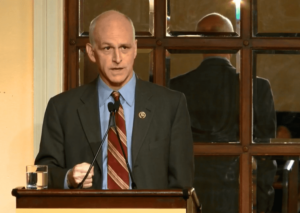The head of the House Armed Services Committee (HASC) said Tuesday he is optimistic his panel’s version of the next defense authorization bill will receive bipartisan support, and predicts differences with the Senate on several key provisions, such as a new Indo-Pacific initiative, can be reconciled when the bill heads to conference.
Rep. Adam Smith (D-Wash.) told reporters HASC’s markup hearing for the FY ‘21 National Defense Authorization Act will likely be less contentious than last year without having to resolve differences on the topline, border wall funding and debate over low-yield nuclear warhead provisions.

“I am always optimistic. It’s just my nature,” Smith said. “We fought [those issues] and we’ve resolved most of those issues, so I think there’s a greater possibility of getting a bipartisan bill.”
HASC is set to markup its version of the NDAA on Wednesday, while the Senate voted on Monday evening to invoke cloture and formally begin debate on its bill.
Smith noted the bipartisan budget agreement has settled debate on the topline, with this year’s bill arriving at $741 billion, while the HASC chairman did note progressive Democrats have opened the conversation on addressing future defense funding toplines.
“I do understand and respect that progressives want to see that number cut. That’s a conversation we will have in the future, but for this year [$741 billion] is the number that we’re marking to,” Smith said.
Rep. Barbara Lee (D-Calif.), a a member of the House Appropriations Committee and co-chair of the Policy and Steering Committee, has introduced a bill June that would cut the annual defense budget by up to $350 billion (Defense Daily, June 16).
On the low-yield nuclear warhead program, Smith added, “that battle has been lost and that system has gone forward” after the Senate prevailed in including authorizing funding out of last year’s conference.
For border wall funding, Smith doesn’t expect the topic to be a major issue at Wednesday’s hearing since the administration has made no formal request to reprogram DoD funds in FY ‘21 to use toward wall construction, as it did in FY ‘20.
HASC’s FY ‘21 mark, however, does cap the amount of military construction (MILCON) funds that can be taken for emergency spending.
“We do that, not so much because of the wall in this case, but to protect MILCON. I don’t want this president or future presidents to look at MILCON as a piggy bank for any purpose,” Smith said.
Looking toward conferencing the bill with the Senate, Smith said he’s confident that differences can be resolved on areas such as research and development funding for the Space Development Agency as well as provisions related to new Pacific Deterrence Initiatives.
HASC’s bill emphasizes strengthening partnerships with allies in the Indo-Pacific, while SASC’s version details plans for a $6 billion program to boost deterrence against China in the region (Defense Daily, June 12).
“There is a substantive difference. The way I view this is as an opportunity to build partner capacity and to build relationships with partners we have. We did it with the European Defense Initiative and European nations, here we can do it with nations in Asia,” Smith said. “I don’t know much different that is from the language in the Senate. If the Senate is contemplating that we have to build up a sufficient military to win a war with China, I’m troubled by that arms race approach. I think what we have to do is we need to have strong enough partnerships and build the alliances in the region to force China to play by the rules.”
On negotiating with the Senate regarding their push to eliminate the Pentagon’s Chief Management Officer (CMO) role, Smith said he’s inclined to keep the position in place but could be open to changing his view.
Rep. Mac Thornberry (R-Texas), the HASC ranking member, told reporters Monday he would like to see an amendment introduced that follows the Senate’s plan to eliminate the Pentagon’s CMO position (Defense Daily, June 29).
“I am still being educated on that point, But my initial take, and I confess this primarily from talking to the CMO but I’ve also talked with Mr. Thornberry about it, is we keep changing this,” Smith said. “Changing this up all the time makes it more difficult. The CMO, I think, has only been around a couple of years.”